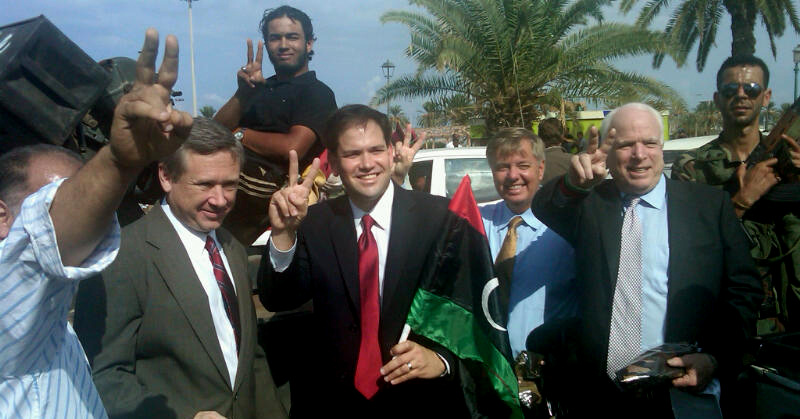Seven Years after NATO Overthrew Gaddafi in Libya, Western-Backed Gov Begs for Another Intervention
The current situation in Libya and the GNA’s recent plea should serve as a cautionary tale regarding the inefficacy of NATO-backed and UN-backed regime-change operations, which have left nothing but chaos and failed states in their wake.
by Whitney Webb
TRIPOLI, LIBYA — A month of violent in-fighting in Libya’s capital has prompted the “official” government of Libya to call for UN intervention, just seven years after the 2011 NATO intervention laid waste to the country and plunged it into a state of chaos from which it has never recovered.
In late August, the Libyan capital of Tripoli became gripped by in-fighting between rival militant factions, factions that all technically operate under Libya’s UN-recognized Government of National Accord (GNA). The fighting allegedly began when one of the armed groups, the Kaniyat, launched an attack on Tripoli after media reports had emerged detailing the lavish lifestyles of other GNA armed groups, like the Tripoli Revolutionaries’ Brigade.
Local media reports have indicated that the warring groups have used heavy weapons, including artillery, to gain the upper hand and that residential areas have been targeted. In addition, the chaos in the capital also resulted in one of the largest prison breaks in Libya’s history, resulting in the escape of around 400 detainees, some of whom joined the fight.
The fighting has taken its toll, with at least 115 people dead and 383 wounded – many of them civilians. Many of the city’s civilians have fled over the past month, as the fighting showed no sign of slowing down. However, an estimate from Doctors Without Borders (MSF) stated that at least 8,000 civilians remain trapped in the conflict zone with no means to escape the violence.
Despite the gravity of the situation and the undeniable chaos raging within the city, the GNA has publicly claimed that it is continuously patrolling the city and that the “situation is under control.” Despite such “official” assurances, however, the GNA privately acknowledged to the UN mission in Libya that it was unable to restore order to the city on its own and then pleaded for the direct intervention of the UN Security Council.
Specifically, the GNA asked the UN’s formal presence in the country to “present the Security Council with the reality of the bloody events in Libya so that it can […] protect the lives and property of civilians.”
Notably, it was the UN Security Council that enacted a “no fly zone” in Libya just seven years ago, an act that enabled the NATO-backed overthrow of former Libyan leader Muammar Gaddafi. Since Gaddafi’s overthrow, the country – which once boasted the highest standard of living in all of Africa – has become a terrorist breeding-ground that still lacks a functional central government, allowing everything from an illegal arms-trade to the public trading of slaves to flourish.
The inefficacy and destructiveness of such intervention

Neo-conservative Republican Senators Mark Kirk, Marco Rubio, Lindsey Graham and John McCain visit Libya not long after Gadhafi’s fall. Photo | Twitter
Furthermore, it has long since been revealed that the motive behind Gaddafi’s overthrow was not that he was “killing his own people” — as the official story goes – but that he had backed a Pan-African gold-backed currency, which presented a threat to the U.S.-backed petrodollar system; that he had illegally financed the campaign of then-President of France Nicolas Sarkozy, representing a major liability to the powerful French politician; and that he had called on a united Africa to stop depending on the U.S. and the West.
Now, seven years later, the UN Security Council is being asked to intervene to solve a problem it helped create. However, given the fragmented nature of Libya – with the GNA in the West, the “rogue” government of Khalifa Haftar in the East, and radical terror groups like Daesh (ISIS) sprinkled throughout – it seems highly unlikely that any future Security Council intervention will succeed in restoring order to the troubled country.
If anything, the current situation in Libya and the GNA’s recent plea should serve as a cautionary tale regarding the inefficacy of NATO-backed and UN-backed regime-change operations, which have left nothing but chaos and failed states in their wake.
Top Photo | Smoke rises from a home destroyed by an airstrike as Libyan fighters from the U.N.-backed GNA advance into Sirte, Libya, October 14, 2016. Photo | Reuters
